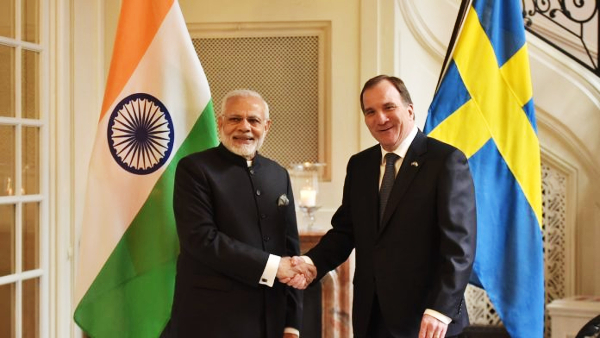India and Sweden are likely to sign their first maritime cooperation agreement, Cooperation in Polar Science, during the visit to India of the Swedish royal couple and senior Ministers, including Foreign Minister Anne Linde.
“We have a Memorandum of Understanding (MoU) that’s being prepared, its both Arctic and Antarctic, so we call it Polar encompassing both… It has been in the works for some time. We have a tentative agreement,” Swedish Ambassador to India Klas Molin told The Hindu, ahead of the visit of King Carl Gustaf and Queen Silvia from December 1 to 6.
In the last few years, India has signed a series of maritime information exchange as well as military logistics support agreements, extending the reach of its armed forces.
The pact with Russia, in advanced stages of discussion, will give India access to Russian bases in the Arctic for logistics and operational turnaround. However, the agreement with Sweden is scientific in nature.
Mr. Molin said the Swedish government made it clear that it saw defence as one important area “continually” between the two countries and the Swedish government was “behind Saab’s efforts” to pitch its Gripen fighter for the Indian Air Force’s tender for 114 jets. The company remains very interested, he said, adding, “We are waiting to hear from the Indian authorities on the next step.”
Asked whether Sweden had spoken to the U.S. about the tender to avoid problems in future as the Gripen is powered by an American engine and has other U.S.-origin components, Mr. Molin said, “There is no such issue.”
Approvals needed
Observing that any aircraft today anywhere has components from different countries, he said his take was that Saab had offered to be a partner and obviously, the approvals needed, in this case from the American partners, “have been discussed and acquired, otherwise they wouldn’t be a contender”.
U.S. companies Boeing and Lockheed Martin are also in the race with their F-18 and F-16 fighter jets.
In that direction, he raised some issues with the Strategic Partnership (SP) policy of the Defence Procurement Procedure under which the fighter tender is being processed apart from few other big ticket deals.
The Swedish Envoy observed that the introduction of SP policy has also raised questions on “future responsibility and ownership” among others which has also been discussed by other partner countries as well with India. Stating that SAAB was in a better position to answer that he said one of the issues is “taking on certain responsibility but not having ownership and thus control on the end product.”
In an exclusive conversation with The Hindu recently, Micael Johansson, President and CEO of SAAB too said they need clarity on some of the provisions of SP policy.
Under the SP policy, foreign OEMs have to tie up with Indian private companies to build the platform locally. Recently, SAAB pulled out of the Navy’s tender for six advanced conventional submarines under Project-75I citing tough provisions and lack of clarity on the SP route under which the tender was being processed.
Source: The Hindu
Image Courtesy: PIB
You may also like
-
IAF Aircraft Set Course For Exercise Eastern Bridge VII At Oman
-
India-us Working Together In Areas Like Critical Minerals, Supply Chains And Advanced Technologies: Shri Piyush Goyal
-
Defence Secretary to co-chair 5th India-Philippines Joint Defence Cooperation Committee meeting in Manila
-
2nd India-Japan Finance Dialogue held in Tokyo on 6th September, 2024
-
Prime Minister, Shri Narendra Modi welcomes Crown Prince of Abu Dhabi
